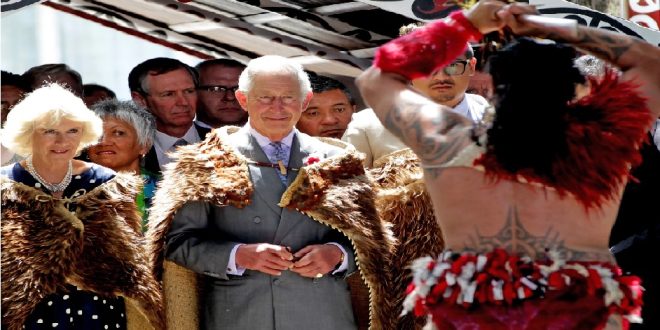06-05-2023
Bureau Report + Agencies
MELBOURNE: On the eve of King Charles’s coronation, Indigenous leaders from around the globe have called on the British monarch to apologize and make amends for what they call ‘genocide’.
 A joint letter published on Friday by 12 Indigenous advocacy groups in former British colonies demanded the new king “acknowledge the horrific impacts on and legacy of genocide and colonization of the Indigenous and enslaved peoples of Antigua and Barbuda, Aotearoa (New Zealand), Australia, The Bahamas, Belize, Canada, Grenada, Jamaica, Papua New Guinea, Saint Kitts and Nevis, Saint Lucia, and Saint Vincent and the Grenadines”.
A joint letter published on Friday by 12 Indigenous advocacy groups in former British colonies demanded the new king “acknowledge the horrific impacts on and legacy of genocide and colonization of the Indigenous and enslaved peoples of Antigua and Barbuda, Aotearoa (New Zealand), Australia, The Bahamas, Belize, Canada, Grenada, Jamaica, Papua New Guinea, Saint Kitts and Nevis, Saint Lucia, and Saint Vincent and the Grenadines”.
The letter also listed key demands, including a formal apology, the repatriation of the remains and cultural artefacts of Indigenous peoples, financial reparations, and requests the king to “help our communities recover from centuries of racism, oppression, colonialism and slavery”.
Rawiri Waititi, co-leader of New Zealand’s Te Pāti Māori (Māori Party) and a signatory to the letter, told Al Jazeera that “Indigenous peoples are speaking up around the world to ensure that the Crown takes full responsibility for the impacts, the damage and the hurt it created.”
British colonization began in the late 16th century, and at its height in 1922, the United Kingdom, with the monarch as its head of state, held sway over more than 450 million people across nearly a quarter of the globe.
 Indigenous peoples in colonies such as Australia, New Zealand and Canada were severely harmed by the invasion of their traditional lands, and thousands were killed as the British sought to cement control over the territories they had seized. Indigenous people were also exposed to new diseases, while punitive assimilation policies led to the loss of language and culture, and the forced removal of children in policies that continued into the second half of the 20th century.
Indigenous peoples in colonies such as Australia, New Zealand and Canada were severely harmed by the invasion of their traditional lands, and thousands were killed as the British sought to cement control over the territories they had seized. Indigenous people were also exposed to new diseases, while punitive assimilation policies led to the loss of language and culture, and the forced removal of children in policies that continued into the second half of the 20th century.
Communities throughout the Caribbean were affected in similar ways, while slavery uprooted millions from Africa to work on sugar plantations throughout the islands.
This effect of these actions, which the joint signatories describe as “crimes against humanity”, resulted in an intergenerational legacy of trauma and inequities in key social indicators such as high incarceration rates and endemic poverty in affected Indigenous communities.
 Pressmediaofindia
Pressmediaofindia




